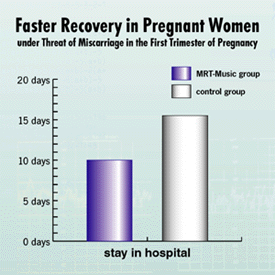The women were brought to the university hospital with great pains in the abdomen and ultrasound diagnoses showed that their pregnancy was at risk.
The reasons for the danger reached from environmentally caused stress situations over nervous mental tensions up to hormonal deficiencies.
On average the patients were 23 years old (±3,1). For seven of the women it was their first pregnancy, eight were pregnant for the second time.
For 8-10 days 15 patients received every day for 30-60 minutes a treatment with the Medical Resonance Therapy Music® via compact disc and headphone and received no other treatment. The patients of this group could leave the hospital successfully treated already after 9-11days – by 35% quicker than the patients in the control group.
In this group 15 women did not listen to MRT-Music® but received hormone drugs, sedatives, spasmolytica and physiotherapy.
The conventionally treated women could leave the hospital successfully treated after 14-17 days.
Investigators:
Prof. Dr. med. G. Gerassimowitsch
Prof. Dr. med. Walentina Sidorenko
Dr. med. Margarita Gawrisch
Dr. med. Tatjana Teterkina
Dr. med. Sergej Korotkow
